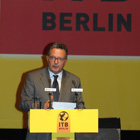Shift out of “expensive” Eurozone as downturn bites
 The number of tourists visiting European destinations in 2009 is expected to contract slightly at best, given the current economic environment, but things could get worse. However, Europeans earning in the Eurozone who retain their jobs in the economic slump will find non-Eurozone destinations more affordable.
The number of tourists visiting European destinations in 2009 is expected to contract slightly at best, given the current economic environment, but things could get worse. However, Europeans earning in the Eurozone who retain their jobs in the economic slump will find non-Eurozone destinations more affordable.
These initial findings and predictions are from the
ITB World Travel Trends Report 2009. The report, produced by IPK International, suggests that new tourist arrivals records are likely to be broken in 2011-2012.“While Europe’s medium to longer-term inbound and outbound travel prospects are good,” said Rolf Freitag, President and CEO of IPK, “the key issue no one can safely predict is just how deep or prolonged the immediate downturn will be. No two recessions are alike. So when national economies revive, will travel immediately pick up, or will there be a time lag?”
IPK says final tourism figures for 2008 are still being collated. However, after a record year for many European destinations in 2007, it seems the deterioration in European economic performance and confidence in Q3 & Q4 2008 will mean that Europe’s overall inbound growth for 2008 will struggle to reach 1%.
Nevertheless, some destinations proved very popular in 2008 and may be in a competitive position to do reasonably well in 2009.
European Travel Commission data shows that Bulgaria, Turkey, Latvia and Slovakia recorded double-digit increases in arrivals for most of 2008. Austria, Croatia, Estonia, Germany, Ireland, Malta, Montenegro, Sweden and Switzerland were also doing better than average up to November.
ADVERTISEMENT
As the economic slump took hold worldwide, Europe’s appeal faded fastest in longhaul source markets. ETC estimates suggest that arrivals from the USA, Japan, China and South Korea were down last year. In contrast, visitors from India to Europe were not deterred. Some destinations saw double-digit growth from this market.
2009 indicators for Europe will become a clearer when full-year 2008 results are released in the ITB World Travel Trends Report 2009 in March. However, shifting currency exchange rates are already clearly impacting travel decisions.
“It seems that destinations in the eurozone are likely to continue suffering from a strong euro,” said Dr Martin Buck, Director of the Competence Center Travel & Logistics at Messe Berlin, which commissions the ongoing research from IPK.
“An emerging trend is for Europeans to divert to cheaper non-eurozone destinations. Turkey recorded an increase of about 13% in 2008 and should continue to be a major beneficiary in 2009,” he said.
Initial findings from IPK International’s latest research, to be published in the World Travel Trends Report 2009, suggest Europeans are poised to choose destinations closer to home. “As over 50% of arrivals to all destinations around the world depend on Europeans, this could be bad news for longhaul destinations in Asia, the Americas and Africa,” said Mr Freitag. “The 3% growth in European outbound travel we were seeing in the first three quarters of last year is likely to evaporate and probably turn negative in 2009,” he said.
Germany and the UK together account for 35% of total European outbound trips. Both economies are in recession with job losses rising. Destinations around the world may have to look to new European source markets such as Russia, Finland, Norway and Sweden, which all posted above average outbound growth for much of 2008.
“When we convene at ITB Berlin in March, the 2009 edition of the ITB World Travel Trends Report will marry full-year 2008 figures and the latest Q1 economic trends,” said Dr Buck. “The travel industry will then better know what to expect from 2009 and beyond. Destinations that adapt their marketing strategies based on the latest data will feel less pain.”
IPK is currently interviewing outbound travellers across Europe to try to determine their travel intentions over the next 12 months, as well as the likely impact of the current crisis on their travel behaviour.
Highlights of the survey results will also be presented by Rolf Freitag at the ITB Berlin Convention’s Future Day.
——-

